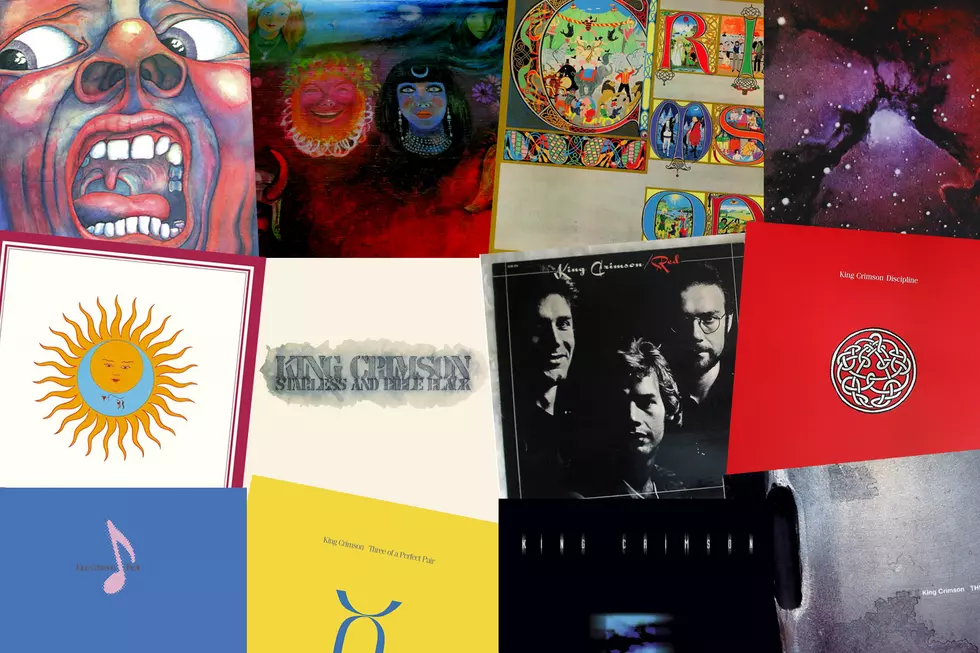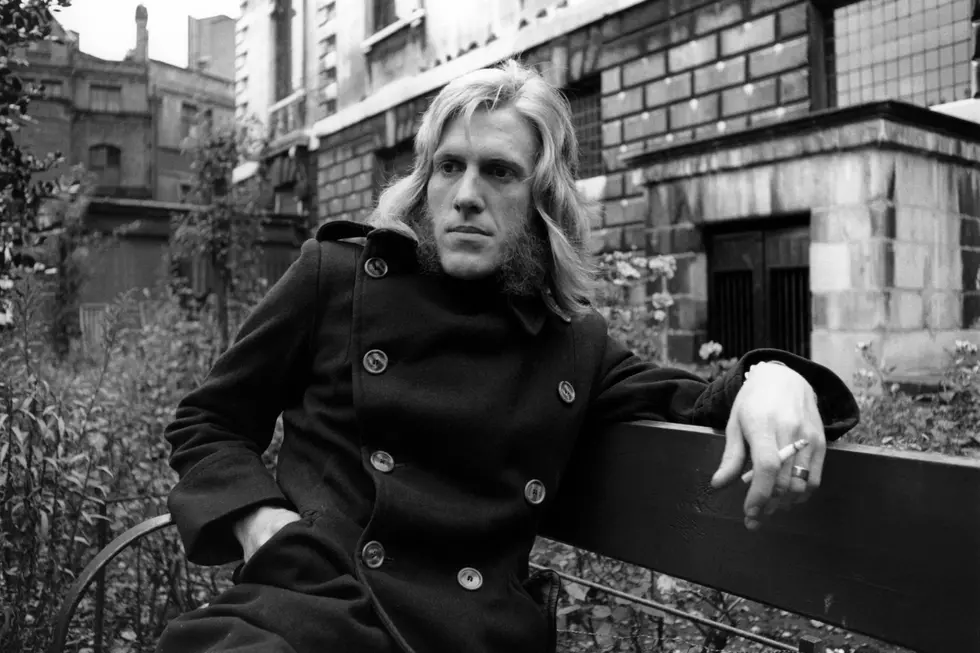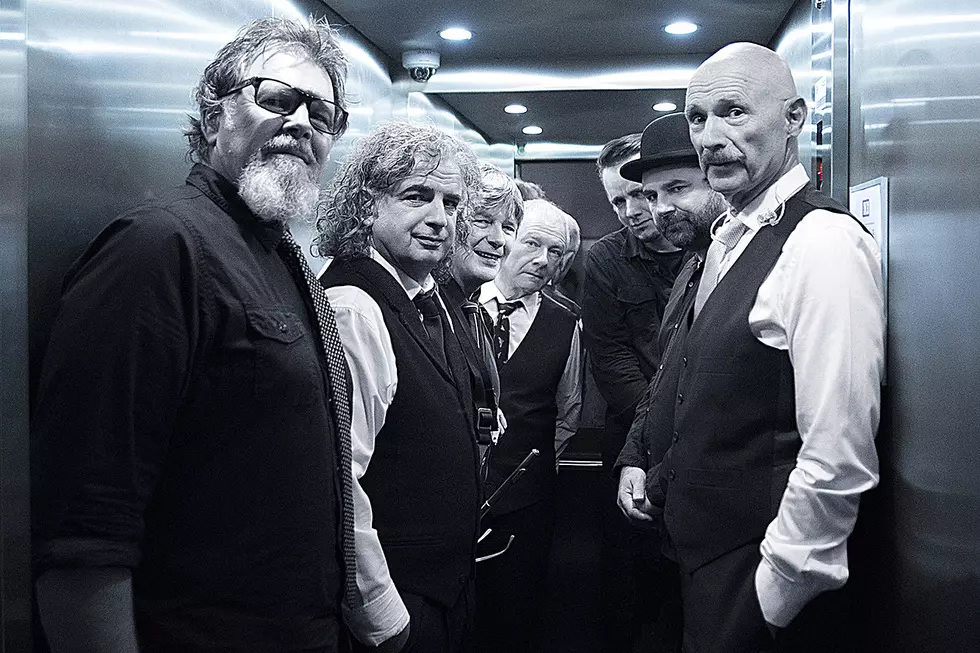
The Best Song From Every King Crimson Album
Robert Fripp famously retired from the music business in 2012, calling the entire enterprise "an exercise in futility." Then, just barely one year later, he returned with his most unorthodox move to date: a reshaped, seven-piece King Crimson lineup featuring a frontline of three drummers.
All of which to say he's never been able to predict the band's unseen spirit, but he knows when it shows up. “I have to be able to recognize when King Crimson is in the room," he later observed.
There might not be shared musical DNA between, say, the dark, symphonic sweep of 1969's "21st Century Schizoid Man" and the new wave pop-rock of 1982's "Heartbeat." But somehow, in their respective contexts, both feel perfectly Crimson-y.
We surveyed the band's entire catalog, documenting the best song from each of King Crimson's 13 LPs.
"In the Court of the Crimson King"
From: In the Court of the Crimson King (1969)
"In '68, we were sort of the local band in London that was spoken about very well," former Yes singer Jon Anderson told In the Studio. "And then we went to the Speakeasy one night, and we heard this band was playing called King Crimson. We said, 'OK, let's check them out, see how good they are.' They were great; they seriously were great. … We had a big cloud over us for about a week, trying to get over the fact that they were better than us." One centerpiece of that early live set — and later, the band's debut LP — was "In the Court of the Crimson King," a mellotron-plated epic that came to define the early symphonic-prog style. Greg Lake's robust vocal, Fripp's painterly guitar phrases, Ian McDonald's lyrical flute, the abstract imagery of Peter Sinfield's poetry, the frantic jazziness of Michael Giles' drums — that combination was radical in the late '60s, and it sounds no less jolting today.
"Pictures of a City"
From: In the Wake of Poseidon (1970)
Just as "In the Wake of Poseidon" mirrors the mellotron majesty of "Crimson King," this strutting, snarling song recalls "21st Century Schizoid Man" — though it's a bit less frightening. Mel Collins' jazzy saxophones and Fripp's chromatic attack earn the most attention, but it's also worth highlighting Sinfield's dreamlike lyrics, which feel like hallucinated observations of a seedy metropolis: "Greased hand teeth hide tinseled sin," Lake sings. "Spice ice dance chance sickly grin."
"Cirkus"
From: Lizard (1970)
While remastering the divisive Lizard in 1999, Fripp made the following observation on his DGM web diary: "The album is unlistenable. Our remastering shows just how unlistenable. I am unable to recommend that anyone part with their hard-earned pay for this one, unless they want to take it to parties and play it at unwelcome guests. There are some Lizard lovers, I know. They must be very strange." But as Fripp of all people should know, strange can sometimes be brilliant. "Cirkus," the album's opening salvo, sounds like a more menacing, disorienting version of "classic" early Crimson: the mellotron, the woodwinds, the dramatically belted vocal (by the briefly tenured Gordon Haskell) — all with an extra dash of madness.
"Islands"
From: Islands (1971)
Fripp has humorously referenced famed rock critic Lester Bangs' description of the fourth Crimson LP: "It sounded like music for the advert of a vaginal deodorant." The punk-loving Bangs also likely didn't care for this record's genteel title epic, which stretches out to 12 minutes with rolling waves of Collins' bass flute and Marc Charig's cornet. But it's still a crucial track from the band's early period, proving Fripp could confidently compose outside the confines of massively amplified rock. (The song is now even more powerful live, led by the soothing vibrato of current frontman Jakko Jakszyk.)
"Exiles"
From: Larks' Tongues in Aspic (1973)
David Cross often gets lost in the Crimson shuffle, having only appeared on two full LPs. But his tasteful violin added a new dimension to the band's music on Larks' Tongues in Aspic. That performance is critical on "Exiles," gently supporting a hearty John Wetton vocal that lands near the top of bassist's register. Fripp takes mostly a supporting role on this, their ultimate ballad, adding flourishes of acoustic and a climactic solo full of heavy sustain.
"The Night Watch"
From: Starless and Bible Black (1974)
"The Night Watch" typifies the fractured presentation of Starless and Bible Black, with Crimson blending studio and stage recordings to create a sonic illusion. The shimmery intro, with Bill Bruford's decorative cymbals and Cross' weepy violin, was pulled from a November 1973 show in Amsterdam; the rest, opening with Fripp's ringing guitar harmonics, was tackled at London's AIR, allowing a bit more depth and color to Bruford's punchy rim-click groove and John Wetton's stacked vocal harmonies. "I thought that was very, very cool to go from a live recording into a studio recording, which was typical of Crimson in those days," Wetton told Classic Rock Revisited. "Rather than most bands who would be adding applause to studio tracks to make them sound live, we were subtracting the applause from live tracks to make them sound like they were done in the studio."
"One More Red Nightmare"
From: Red (1974)
This features one of the most menacing riffs in music history, as heavy as anything Black Sabbath ever cooked up — but Bruford is the track's obvious MVP, playing with an especially funky fury during the verse groove. The centerpiece of his kit, at least on this track, is the cracked cymbal he'd discovered discarded in a rehearsal room trash can. "[Its] maltreatment had bequeathed it this fabulous trashy sound with a very short, fast decay," Bruford wrote on his website, dedicating an entire FAQ entry to this piece of gear. "It looked so sad; I took pity on it and we fell in love. I used it for about a year or so before it split, and the end came swiftly after that."
"Elephant Talk"
From: Discipline (1981)
"These are words with a "D" this time," Adrian Belew speak-sings on this prog-funk workout, alphabetically reciting synonyms for human speech. The frontman — a former scene-stealing hired-hand for Frank Zappa, David Bowie and Talking Heads — brought chaotic quirkiness and deep soul to Crimson, revamped by Fripp for the new wave era. It's almost impossible to pick one song from Discipline, but "Elephant Talk" reigns — a full-band showcase built on Tony Levin's jarring Chapman Stick groove, Bill Bruford's subtly trance-y rhythms and the dual guitars of Fripp and Belew, which conjure buzzing mosquitos and roaring elephants, respectively. "Trying to be a writer, I always carried with me a pocket-sized Merriam-Webster dictionary," Belew recalled to Music Aficionado. "Back at the Horton Inn that evening, I went through the dictionary and began marking words with a yellow highlighter pen. I marked words that had to do with speech or talking. I started with words beginning with ‘A.’ Arguments, agreements, answers, advice. By the time I got through the ‘E’s’ I felt I had enough of something to work with."
"Sartori in Tangier"
From: Beat (1982)
Some Crimson songs are impossible to classify, and "Sartori in Tangier" is among them. The frenzied instrumental, built on Levin's thumping low-end and Fripp's violin-like guitar effects, feels like it should be blasting in some frightening Martian nightclub. "The music was very stage-friendly; it had its own internal musical drama which worked well in that environment and it was a complete groove to play live," Bill Bruford told the DGM site. "Nightly I could look forward to Robert's solo at the end of 'Sartori in [Tangier].'"
"Sleepless"
From: Three of a Perfect Pair (1984)
There are three distinct versions of this atmospheric tune: the clunky "Dance" mix, the more four-on-the-floor-oriented single mix (from early pressings) and the definitive, rhythmically complex take that appears on modern reissues. Levin's thwacking bass line is the obvious centerpiece, no matter where you turn, but Bill Bruford's booming toms on the latter mix add another layer of mystery to one of Crimson's purest pop songs. "What happened was that Bob Clearmountain did the single remix and then someone at Warner Bros. decided that the LP version should match the single version," Adrian Belew told Artist Magazine. "So, how's that, folks; even the songwriter doesn't have any say anymore!"
"Sex Sleep Eat Drink Dream"
From: THRAK (1995)
Fripp once again cleared the creative slate in the mid-'90s, reassembling King Crimson in an overstuffed "double-trio" format: he and Adrian Belew on guitars; Levin and Trey Gunn (an alumnus of Fripp's Guitar Craft courses) handling low-end via bass, Chapman Stick and Warr guitar; and Bruford teaming with Pat Mastelotto on drums. The sextet's lone LP, THRAK, is a universe unto itself — borrowing a metallic clang from modern industrial and alt-rock, allowing Belew to salute his '60s rock heroes. "Sex Sleep Eat Drink Dream" pairs Hendrix-y wah-wah with Tool-ish production, peaking around 1:40 with an all-out explosion where the trios play in two different time signatures. "It is one of the best examples of the definition of our double trio," Belew once once remarked. "With a killer bass line from Tony and blistering solos from Robert, it's quintessential Crimson. The lyrics are a reflection of the madness of the music.”
"Into the Frying Pan"
From: The ConstruKction of Light (2000)
King Crimson's 12th LP never takes flight — bogged down by cringe-worthy creative choices (Adrian Belew's pitch-shifted vocal croak on "ProzaKc Blues"), a wispy drum sound, too much idea-recycling ("FraKctured," yet another installment of the "Larks' Tongues in Aspic" series) and too little melody. "Into the Frying Pan" is an exception to all those rules: With Belew's warped, processed vocal harmonies and Pat Mastelotto's stammering rhythms, the track previews the direction they'd master on 2003's The Power to Believe.
"Eyes Wide Open"
From: The Power to Believe (2003)
No King Crimson fan would be at fault selecting monster instrumental "Level Five," the unofficial-yet-official fifth installment of the "Larks Tongues" series. But "Eyes Wide Open" is the most dynamic piece on the band's most recent (and hopefully not final) LP. Adrian Belew is mostly in balladeer mode, crooning gently over cushy electronics and a dual guitar chime with Fripp. “There’s a necessity for the softer side, the melodic side,” Belew told Vintage Rock. “‘Eyes Wide Open’ is funny to me. One day, Robert and I were sitting quietly in my studio trying to invent some more ideas and we started playing in the same way that we used to play in the ’81 band, that sort of interlocking guitar stuff that makes up songs like ‘Discipline’ or ‘Neal and Jack and Me.’ We hadn’t played that way together for a long time — 20 years, I guess. And we looked at each other and said, ‘You know what — we kind of invented this; it’s ours to use if we want to.'"
See How King Crimson and Others Got Their Names
More From Rock 104.1








